
History Quiz (Super Hard)
Difficulty : Hard Get 4/10 correct to pass the quiz
Question 1 of 10
Who wrote the book A Brief History Of Time?
Question 2 of 10
Henry VIII of England had how many wives?
Advertisement
Question 3 of 10
Iosif Vissarionovich Dzhugashvili was the birthname of which historical figure?
Question 4 of 10
In what year did the 'Battle of Makin' occur during World War II?
Question 5 of 10
Bill Gates was born in which US city?
Question 6 of 10
Who said: "It is never too late to be what you might have been"?
Question 7 of 10
What was the 1963 UK Beeching Report about?
Advertisement
Question 8 of 10
How much was tuition at Harvard per year in 1970?
Question 9 of 10
In what year was South Sudan created as a country?
Question 10 of 10
Which President appointed John McKinley as Associate Justice of the Supreme Court of the United States?
Advertisement

MORE QUIZZES
1960s Song Quiz
10 questions lined up
10 questions lined up
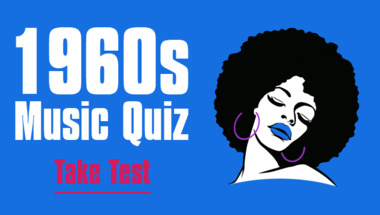
Trivia Quiz : The Average Jo
Most people wont even get 7 out of 10 correct
Most people wont even get 7 out of 10 correct

** General Trivia Quiz **
>> 10 mixed questions <<
>> 10 mixed questions <<

Albert Einstein Trivia Quiz
10 thrilling questions to have fun with
10 thrilling questions to have fun with
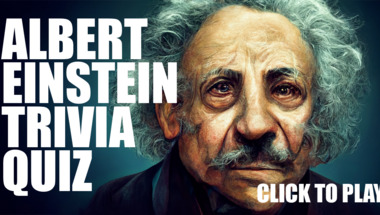
Trivia quiz for general know
10 questions covering a variety of categories
10 questions covering a variety of categories

10 fun questions about mixed
How many correct will you get?
How many correct will you get?

General Trivia Quiz
Let's see how smart you really are!
Let's see how smart you really are!
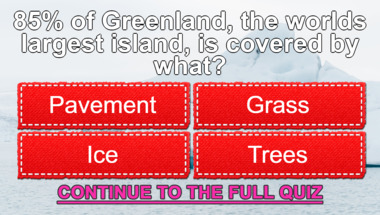
Fun movie quiz
10 exciting questions
10 exciting questions

World Geography Quiz For You
Tell us your result in the comments
Tell us your result in the comments
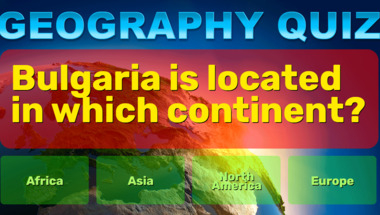
Advertisement
Groovy 1970s Music Challenge
How many questions will you nail in this 10-t..
How many questions will you nail in this 10-t..

Trivia Quiz
Are you smart enough for this one?
Are you smart enough for this one?

Knowledge Quiz For Everyone
Theme : Around The World
Theme : Around The World

Quiz for people 50+
10 mixed questions
10 mixed questions

World History Trivia Quiz
10 mixed questions
10 mixed questions

Quiz : Songs of the 1980s
Let us know your score in the comments
Let us know your score in the comments

Fun trivia quiz
10 mixed up questions
10 mixed up questions

General trivia quiz
10 mixed questions
10 mixed questions

General Knowledge Quiz (10 q
Are you up for a quiz?
Are you up for a quiz?

Advertisement
Quiz : War
How many of them will you answer correctly?
How many of them will you answer correctly?

Trivia Quiz
10 questions to test your knowledge
10 questions to test your knowledge

Mixed geography questions
10 challenging questions
10 challenging questions
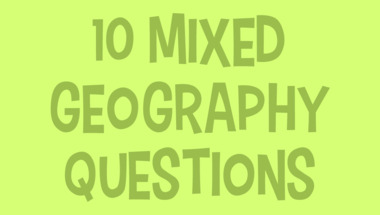
History Quiz
10 mixed questions
10 mixed questions

Movie Quiz
10 mixed questions
10 mixed questions
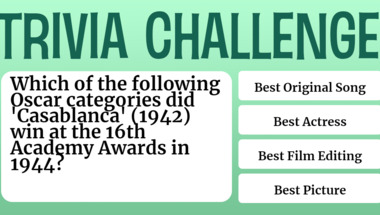
Mixed Knowledge Quiz
Can you beat these 10 questions?
Can you beat these 10 questions?

General Trivia IQ challenge
10 mixed trivia questions
10 mixed trivia questions

General Trivia Quiz
The last two questions will be your nemesis! ..
The last two questions will be your nemesis! ..

It is time for a trivia quiz
10 questions in different categories
10 questions in different categories

Advertisement
Fresh trivia quiz
10 trivia questions waiting here
10 trivia questions waiting here

A quiz for home cooks and fo
10 questions for food lovers and home cooks
10 questions for food lovers and home cooks

1950s Song Quiz
How many songs can you guess?
How many songs can you guess?

Back to school quiz
10 questions lined up
10 questions lined up

General Trivia Quiz
10 mixed questions
10 mixed questions

General Knowledge For Trivia
Post your score in the comments!
Post your score in the comments!

VERY hard trivia quiz
A score above 4/10 is amazing
A score above 4/10 is amazing
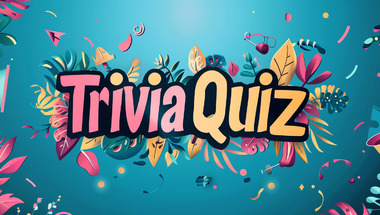
Trivia Quiz
10 questions
10 questions

1960s History Quiz
What do you remember?
What do you remember?

Advertisement
General Trivia Fun Challenge
10 entertaining quiz questions
10 entertaining quiz questions
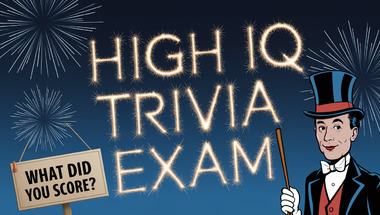
Do you remember the 1970s?
10 questions to test your memory
10 questions to test your memory

Trivia Quiz for the smart
10 questions
10 questions

Quiz on General Trivia
10 questions with a variety of topics
10 questions with a variety of topics

General Trivia Quiz
10 mixed questions
10 mixed questions

Do you know these 10 songs f
Let us know your score in the comments
Let us know your score in the comments

General Trivia Challenge
10 random questions
10 random questions

Mixed trivia quiz
Lets see how smart you really are!
Lets see how smart you really are!
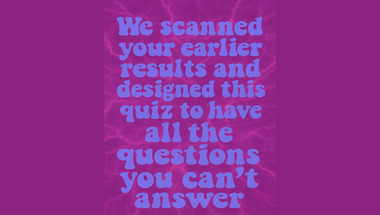
Quiz consisting of general t
Can you come up with 10 enjoyable inquiries?
Can you come up with 10 enjoyable inquiries?

Advertisement
A quiz on history that is su
10 fun questions about history
10 fun questions about history

Super hard trivia quiz
10 mixed questions for you
10 mixed questions for you

General Trivia Quiz
High IQ questions
High IQ questions

Mixed knowledge questions
Are you game?
Are you game?

Trivia Quiz
10 fun questions
10 fun questions

General trivia quiz
10 mixed questions
10 mixed questions

10 trivia questions in one f
How high will your score be?
How high will your score be?

Quiz time
Trivia quiz. 10 questions
Trivia quiz. 10 questions

Trivia quiz for smart people
How many correct will you get?
How many correct will you get?

Advertisement
History Quiz
What do you remember?
What do you remember?
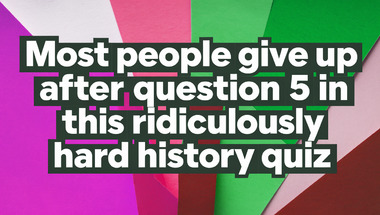
Impossible general knowledge
How many correct will you get?
How many correct will you get?

General Knowledge For Trivia
Here's 10 Questions For You To Have Fun With!
Here's 10 Questions For You To Have Fun With!

Cooking quiz
10 questions
10 questions

Seniors' Historical Trivia Q
Put your knowledge to the test with these 10 ..
Put your knowledge to the test with these 10 ..

General Trivia Quiz
10 questions to test your knowledge
10 questions to test your knowledge

Quiz : Old expressions
10 questions
10 questions

10 mixed general knowledge q
Click here to have fun
Click here to have fun

General Trivia Quiz
10 questions to answer
10 questions to answer

Advertisement
Quiz about famous people
How many correct will you get?
How many correct will you get?

10 general trivia questions
A quiz about nothing and everything
A quiz about nothing and everything

1970s Song Quiz
How many correct answers will you get?
How many correct answers will you get?

History Quiz : Europe 1940-1
How much do you remember?
How much do you remember?
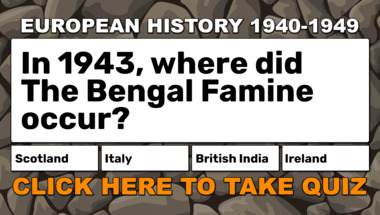
Quiz : We removed a word fro
Can you help us find the missing words?
Can you help us find the missing words?

A quiz about knowledge
10 mixed questions
10 mixed questions

Science & Animal Trivia Quiz
Tell us your result in the comments
Tell us your result in the comments

Geography Quiz (Super Hard)
Can you score 5 or higher?
Can you score 5 or higher?

General trivia quiz
10 mixed questions
10 mixed questions

Advertisement
Food & Cooking Quiz
10 mixed questions for you
10 mixed questions for you

General trivia exam
10 questions to challenge your brain
10 questions to challenge your brain

Mixed Trivia Questions
10 questions to test your knowledge
10 questions to test your knowledge

Trivia Quiz
10 questions
10 questions

Back to school quiz
10 questions lined up
10 questions lined up

Test your knowledge with 10
How many questions will you ace in this 10-qu..
How many questions will you ace in this 10-qu..

Movie Quiz For Experts
10 extremely difficult questions
10 extremely difficult questions

History Quiz
Do you know history?
Do you know history?

Movie Quiz
10 entertaining questions
10 entertaining questions

Advertisement
Movie Quiz
10 questions
10 questions

General trivia quiz
10 mixed questions
10 mixed questions

Quiz : 7-8 correct is no cha
9-10 correct is almost impossible
9-10 correct is almost impossible
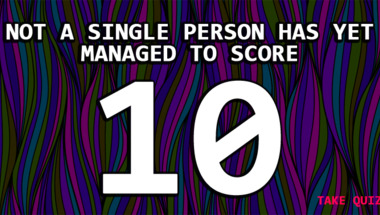
Food/Cooking Quiz
Are you game?
Are you game?

Trivia Quiz for the smart
10 questions
10 questions

Hard trivia quiz
Can you score 8/10?
Can you score 8/10?
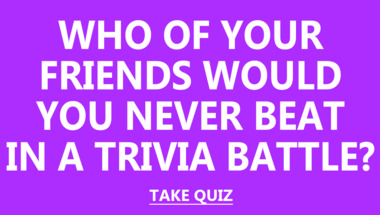
Latin Words Quiz : "What doe
Latin is not easy, so expect around 5 out of ..
Latin is not easy, so expect around 5 out of ..

General Trivia Quiz
We mixed up 10 good questions here
We mixed up 10 good questions here

Seniors' History Quiz
10 trivia questions to challenge your experti..
10 trivia questions to challenge your experti..

Advertisement
Geography Quiz
10 mixed questions
10 mixed questions

General trivia quiz
10 mixed questions
10 mixed questions

Trivia Quiz
Can you score 8/10?
Can you score 8/10?
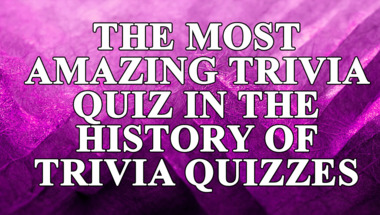
1970s Lyrics Quiz
10 mixed questions
10 mixed questions

1960s Song Quiz
10 mixed questions in one quiz
10 mixed questions in one quiz

Trivia Quiz
10 questions
10 questions

Trivia Quiz : 10 general kno
Are you up for a quiz?
Are you up for a quiz?
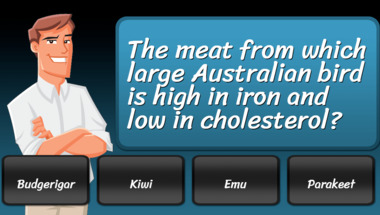
History Quiz : 1960-1969 (Eu
How many correct will you get?
How many correct will you get?
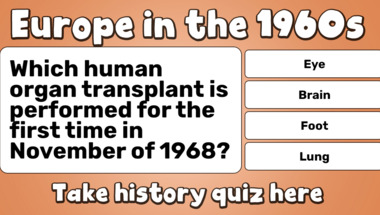
A quiz about the songs lyric
How many of these texts do you remember?
How many of these texts do you remember?

Advertisement
1970s Movie Quotes Quiz
How many of them will you answer correctly?
How many of them will you answer correctly?

History Quiz (Medium Difficu
Let me know your score in the comments
Let me know your score in the comments

General Trivia Challenge
10 random questions
10 random questions
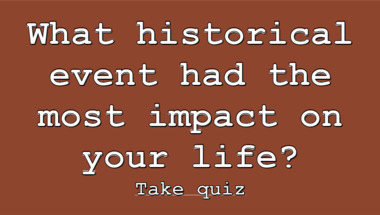
General trivia quiz
Let us know your score
Let us know your score

Geography Quiz
10 mixed questions
10 mixed questions

General Trivia Quiz
10 mixed questions
10 mixed questions

Super Tricky Spelling Quiz
How many correct will you get?
How many correct will you get?

:: General Trivia Quiz ::
10 fun questions
10 fun questions

Quiz : General knowledge
10 questions in misc categories
10 questions in misc categories

Advertisement
10 mixed general knowledge q
Click here to have fun
Click here to have fun

Super fun trivia quiz
Are you a knowledge genius?
Are you a knowledge genius?

Quiz : Do you know 1950s son
10 questions about the songs of the past
10 questions about the songs of the past

Quiz : Latin words
10 questions
10 questions

Expert General Knowledge Qui
How smart are you really?
How smart are you really?

Geography Quiz
10 mixed questions
10 mixed questions

Quiz time
Trivia quiz. 10 questions
Trivia quiz. 10 questions

10 general trivia questions
How many correct will you get?
How many correct will you get?

General Trivia Quiz
10 mixed questions
10 mixed questions

Advertisement
History & Politics Quiz
What do you really know?
What do you really know?

Food & Cooking Quiz
10 questions
10 questions

Amazing Trivia Quiz
10 hot questions
10 hot questions
